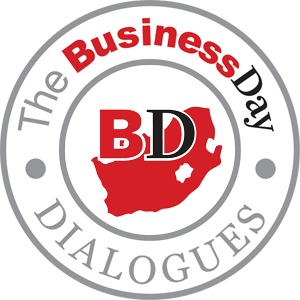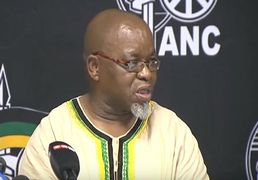ELECTION Day continued in its generally peaceful vein on Wednesday as thousands of young students and Durban inner-city residents lined up to cast their votes at a St Andrews Street polling station.
Many of them are the so-called born frees — born in the year South Africans first voted in a democratic election, 1994 — casting their ballots for the first time in their lives.
A presiding officer, who declined to give her name, said they had expected between 3,000 and 4,000 voters to cast their votes.
Ulundi-born Andile Mbatha, a 19-year-old electrical engineering student, said she was excited to cast her vote for the first time.
"I am both excited and overwhelmed by the huge responsibility of voting," she said. "I had been waiting for the chance for a very long time."
Ms Mbatha was one of 25.3-million South Africans registered to vote in the country’s fifth democratic national election, taking place just days after the 20th anniversary of the first democratic election on April 27 1994. About 31-million South Africans are eligible to vote, given their age.
The topic of discussion in the Durban queue was the availability of National Student Financial Aid Scheme funds. The government scheme funds post-school education for needy students.
But at KwaMashu hostel, the site of pre-election violence, a ring of security protected thousands of hostel dwellers and people from the surrounding informal settlement who lined up to cast their votes.
Scores of people were shot and killed in the months leading to Wednesday’s poll and officials were not leaving anything to chance, with the presence of police Caspirs and heavily armed public order policing officers.
Ntombenhle Mshengu, who has lived in the nearby informal settlement for more than six years, said she hoped that her vote this time would change her situation.
"I want better house and a better life for my family. I am tired of living in this abject poverty and the party I am going to vote is the one that will change our lives for the better. But my vote is secret," said Ms Mshengu with a wry smile.
Other hostel residents said they wanted an end to sporadic violence and shootings that had plagued the hostel a few months ago and many expressed relief that aggressive campaigning, with its attendant tension, would now be a thing of the past.
Police spokesman Col Jay Naicker said on Wednesday they had not had any report of disruptions in the province.
"Everything is going well so far and our officers are on standby to help where necessary," he said.
Election official Mawethu Mosery said only a few technical glitches had prevented some voting stations in the province from starting on time.
"However, these were later sorted out and we are pleased with the voter turnout so far," he said.
The African National Congress (ANC) in KwaZulu-Natal commended the Electoral Commission of South Africa (IEC) for its handling of the electoral process.
"However, the ANC has been made aware of reports of intimidation at Mandlanzini voting station in Empangeni, where some people were using a loud hailer telling people not to vote. We have confidence that the police will take control of the situation with a strong presence in the area," said ANC secretary Sihle Zikala.
Officials said 97 people had been arrested for election-related crimes and 131 cases had been registered, but electoral commission vice-chairman Terry Tselane vowed on Wednesday morning that residents of areas that had experienced violent protests in the days running up to the polls would be given the opportunity to vote.
Areas including Bekkersdal on the West Rand and Gugulethu on the East Rand have seen tension and protests with an "anti-election" flavour as protesters attempted to declare their communities "no go areas" for IEC staff and officials.
Residents in a Gugulethu informal settlement told Business Day on Tuesday that they wanted to vote but were not sure if they would be given the opportunity to do so after protesters burnt down a tent set up in the area as a voting station.
"We will make sure everyone who can vote and would like to vote will be given the opportunity to do so. There is increased security and temporary stations will be set up in those areas. We will not allow violence to stop people from exercising their rights," Mr Tselane said.
The number of election incidents was significantly lower than in previous years, despite instances of delayed opening of polling stations due to logistical problems and community protests problems were not expected to persist through the course of the day, the commission said.
Chief electoral officer Mosotho Moepya, speaking at the commission’s command centre in Pretoria on Wednesday, said 95% of voting stations were running, despite delays, including the late arrival of staff.
The number of instances was small compared to previous elections.
In Nkandla, KwaZulu-Natal President Jacob Zuma cast his ballot in his home village, as did other politicians on their respective home turfs.
Striking mine workers on the Rustenburg platinum belt and mining communities turned out in their thousands to cast their votes in today’s election.
The atmosphere was relaxed and calm, with people waiting patiently in long queues, abiding strictly by election rules not to display party insignia or to campaign. There was, however, a clear intention unanimously expressed among voters that they have come "to vote for change".
The large turnout and very clear oppositional stance is an indication of how events since 2012 have turned these communities against the ANC.
The area is mired in a strike that began on January 23, and was the scene, in 2012, of South Africa’s worst police killing since the 1960 Sharpeville massacre, in which 69 anti-pass demonstrators were killed in the Vaal Triangle township. In August 2012, 34 striking miners were killed during a protest at Lonmin’s Marikana mine.
"They have come in large numbers to vote peacefully. From the way people in the community have talked about voting, I think everybody will come. We want change. Every vote will make a difference," said a Lonmin employee, who did not want to be named.
ELECTION Day continued in its generally peaceful vein on Wednesday as thousands of young students and Durban inner-city residents lined up to cast their votes at a St Andrews Street polling station.
Many of them are the so-called born frees — born in the year South Africans first voted in a democratic election, 1994 — casting their ballots for the first time in their lives.
A presiding officer, who declined to give her name, said they had expected between 3,000 and 4,000 voters to cast their votes.
Ulundi-born Andile Mbatha, a 19-year-old electrical engineering student, said she was excited to cast her vote for the first time.
"I am both excited and overwhelmed by the huge responsibility of voting," she said. "I had been waiting for the chance for a very long time."
Ms Mbatha was one of 25.3-million South Africans registered to vote in the country’s fifth democratic national election, taking place just days after the 20th anniversary of the first democratic election on April 27 1994. About 31-million South Africans are eligible to vote, given their age.
The topic of discussion in the Durban queue was the availability of National Student Financial Aid Scheme funds. The government scheme funds post-school education for needy students.
But at KwaMashu hostel, the site of pre-election violence, a ring of security protected thousands of hostel dwellers and people from the surrounding informal settlement who lined up to cast their votes.
Scores of people were shot and killed in the months leading to Wednesday’s poll and officials were not leaving anything to chance, with the presence of police Caspirs and heavily armed public order policing officers.
Ntombenhle Mshengu, who has lived in the nearby informal settlement for more than six years, said she hoped that her vote this time would change her situation.
"I want better house and a better life for my family. I am tired of living in this abject poverty and the party I am going to vote is the one that will change our lives for the better. But my vote is secret," said Ms Mshengu with a wry smile.
Other hostel residents said they wanted an end to sporadic violence and shootings that had plagued the hostel a few months ago and many expressed relief that aggressive campaigning, with its attendant tension, would now be a thing of the past.
Police spokesman Col Jay Naicker said on Wednesday they had not had any report of disruptions in the province.
"Everything is going well so far and our officers are on standby to help where necessary," he said.
Election official Mawethu Mosery said only a few technical glitches had prevented some voting stations in the province from starting on time.
"However, these were later sorted out and we are pleased with the voter turnout so far," he said.
The African National Congress (ANC) in KwaZulu-Natal commended the Electoral Commission of South Africa (IEC) for its handling of the electoral process.
"However, the ANC has been made aware of reports of intimidation at Mandlanzini voting station in Empangeni, where some people were using a loud hailer telling people not to vote. We have confidence that the police will take control of the situation with a strong presence in the area," said ANC secretary Sihle Zikala.
Officials said 97 people had been arrested for election-related crimes and 131 cases had been registered, but electoral commission vice-chairman Terry Tselane vowed on Wednesday morning that residents of areas that had experienced violent protests in the days running up to the polls would be given the opportunity to vote.
Areas including Bekkersdal on the West Rand and Gugulethu on the East Rand have seen tension and protests with an "anti-election" flavour as protesters attempted to declare their communities "no go areas" for IEC staff and officials.
Residents in a Gugulethu informal settlement told Business Day on Tuesday that they wanted to vote but were not sure if they would be given the opportunity to do so after protesters burnt down a tent set up in the area as a voting station.
"We will make sure everyone who can vote and would like to vote will be given the opportunity to do so. There is increased security and temporary stations will be set up in those areas. We will not allow violence to stop people from exercising their rights," Mr Tselane said.
The number of election incidents was significantly lower than in previous years, despite instances of delayed opening of polling stations due to logistical problems and community protests problems were not expected to persist through the course of the day, the commission said.
Chief electoral officer Mosotho Moepya, speaking at the commission’s command centre in Pretoria on Wednesday, said 95% of voting stations were running, despite delays, including the late arrival of staff.
The number of instances was small compared to previous elections.
In Nkandla, KwaZulu-Natal President Jacob Zuma cast his ballot in his home village, as did other politicians on their respective home turfs.
Striking mine workers on the Rustenburg platinum belt and mining communities turned out in their thousands to cast their votes in today’s election.
The atmosphere was relaxed and calm, with people waiting patiently in long queues, abiding strictly by election rules not to display party insignia or to campaign. There was, however, a clear intention unanimously expressed among voters that they have come "to vote for change".
The large turnout and very clear oppositional stance is an indication of how events since 2012 have turned these communities against the ANC.
The area is mired in a strike that began on January 23, and was the scene, in 2012, of South Africa’s worst police killing since the 1960 Sharpeville massacre, in which 69 anti-pass demonstrators were killed in the Vaal Triangle township. In August 2012, 34 striking miners were killed during a protest at Lonmin’s Marikana mine.
"They have come in large numbers to vote peacefully. From the way people in the community have talked about voting, I think everybody will come. We want change. Every vote will make a difference," said a Lonmin employee, who did not want to be named.













 News, views and analysis of South Africa's national and provincial elections on May 7 2014
News, views and analysis of South Africa's national and provincial elections on May 7 2014












Change: -1.11%
Change: -1.17%
Change: -2.37%
Change: -0.88%
Change: -0.83%
Data supplied by Profile Data
Change: -1.73%
Change: -0.45%
Change: -1.11%
Change: 0.00%
Change: -0.64%
Data supplied by Profile Data
Change: 1.10%
Change: 1.10%
Change: 0.84%
Change: 0.88%
Change: 0.93%
Data supplied by Profile Data
Change: 0.11%
Change: -0.10%
Change: 0.66%
Change: -1.72%
Change: -2.37%
Data supplied by Profile Data